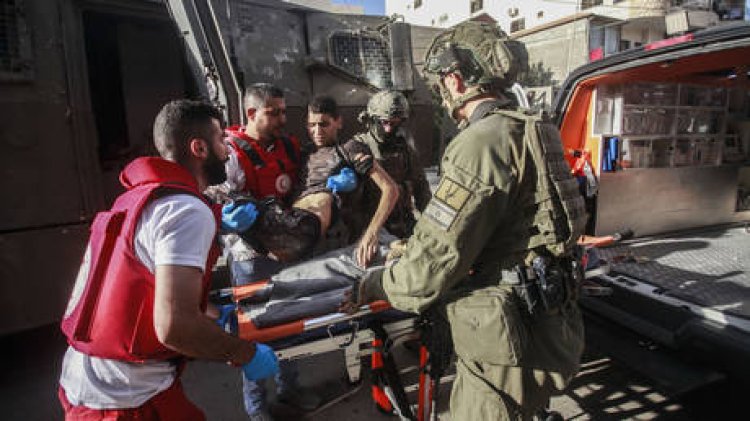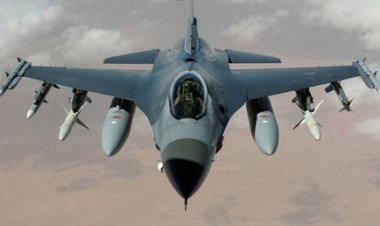Israel's Tactics in Targeting Palestinian Medics
The recent incident involving the deaths of 15 uniformed first responders on their way to work highlights an unsettling reality: this is yet another instance in a prolonged history of similar atrocities. The Israeli army has reportedly executed...

The Israeli army has reportedly executed 15 Palestinian medics in Gaza, subsequently burying them and falsely labeling them as “terrorists.” For those closely following these developments, such brutality is not unprecedented but rather another entry in Israel's ongoing record of war crimes over the years.
The chilling circumstances surrounding the medics—who were bound, executed, and interred in a mass grave—were severe enough to capture the attention of a global media landscape that often remains indifferent. However, the reporting lacked the significant outrage that would likely arise if the perpetrating force were viewed as an enemy of the West.
On March 31, Jonathan Whittall, Head of the UN Office for the Coordination of Humanitarian Affairs in the Occupied Palestinian Territory, posted on X, “First responders should never be a target. Yet today @UNOCHA supported @PalestineRCS and Civil Defense to retrieve colleagues from a mass grave in #Rafah #Gaza that was marked with the emergency light from one of their crushed ambulances.”
His thread detailed a concerning timeline, stating that contact was lost on March 23 with ten members from the Palestine Red Crescent Society and six Civil Defense first responders who were dispatched to aid the injured. Whittall noted, “For days, OCHA coordinated to reach the site but our access was only granted 5 days later.”
When access was finally allowed, they “recovered the buried bodies of 8 PRCS, 6 Civil Defense and 1 UN staff,” he elaborated, emphasizing, “They were killed in their uniforms. Driving their clearly marked vehicles. Wearing their gloves. On their way to save lives. This should never have happened.”
Meanwhile, Mahmoud Basal, a spokesperson for the Palestinian Civil Defense, described the harrowing details, stating, “One of the Civil Defense crews had his feet tied, another had his clothes removed from his upper body, another was beheaded. Among all the martyrs, the least harmed had 20 bullets fired at him, in his chest.”
In addition, the Palestine Red Crescent Society reported that a ninth EMT is unaccounted for and believed to be detained.
Several organizations, including the UN and the Red Cross, have issued statements condemning these killings. Jagan Chapagain, Secretary General of the International Federation of Red Cross and Red Crescent Societies, expressed, “They wore emblems that should have protected them; their ambulances were clearly marked. They should have returned to their families; they did not. These rules of International Humanitarian Law could not be clearer – civilians must be protected; humanitarians must be protected. Health services must be protected.”
Chapagain further noted that 30 PRCS volunteers and staff have lost their lives since October 2023.
OCHA described the murders as “a huge blow to us” and highlighted the need for accountability, stating, “408 aid workers including more than 280 UNRWA staff have been killed in Gaza since the war began on 7 October 2023.”
Tom Fletcher, the UN under-secretary-general for humanitarian affairs and emergency relief coordinator, asserted, “They were killed by Israeli forces while trying to save lives. We demand answers & justice.”
The Guardian featured comments from Dr. Bashar Murad of the PRCS, recounting a chilling account from one of the paramedics in the convoy: “He informed us that he was injured and requested assistance, and that another person was also injured. A few minutes later, during the call, we heard the sound of Israeli soldiers arriving at the location, speaking in Hebrew. ‘Gather them at the wall and bring some restraints to tie them.’ This indicated that a large number of the medical staff were still alive.”
Predictably, Lt. Col. Nadav Shoshani, a spokesperson for the Israeli army, disputed any wrongdoing by Israeli forces, claiming that the ambulances were “advancing suspiciously” toward their troops. He categorized the medics’ execution as an elimination of “a Hamas military operative, along with 8 other terrorists from Hamas and the Islamic Jihad.”
Responses on X challenged Shoshani’s narrative, highlighting the Israeli army's history of targeting ambulances.
Reflecting on personal experiences, a witness described witnessing ongoing attacks against Gaza medics dating back to 2009. During the January 2009 Israeli operation in Gaza, he recounted being in a PRCS ambulance to document their life-saving work amid active shelling.
The witness noted, “But in terms of direct attacks on ambulances and hospitals, I can attest they occurred against unarmed medics in ambulances not carrying any Palestinian resistance, but retrieving wounded or killed Palestinian civilians, including elderly ones.”
Specific incidents included a sniper targeting medics during supposed ceasefires and the direct bombing of hospitals, leading to repeated evacuations and further risks for medics trying to save lives.
Furthermore, there are accounts of medics being fired upon even after coordinating with Israeli forces to provide aid to the wounded. The Palestinian Centre for Human Rights reported similar assaults on ambulance convoys, emphasizing the risks faced by those trying to deliver critical care.
Fast forward to the present, and the attacks on medical infrastructure in Gaza appear to be a consistent pattern. It is evident that the killing of medical workers is perceived by some Israeli soldiers as policy, and despite occasional condemnation from Western powers, there has been no accountability for these actions.
The ongoing detention and reported torture of Palestinian doctors, such as Dr. Hussam Abu Safiya, highlights the severity of the assault on Gaza’s healthcare system, extending beyond direct attacks to include systematic deprivation of critical medical care.
One must pose the question: What global response would arise if another nation were assassinating uniformed, unarmed medics with such impunity? The response would likely be significant and forceful, as evidenced by the attention and outrage directed toward other international conflicts. However, as the cycle of violence continues, Palestinians often receive only muted protests and calls for investigations, while the cycle of violence proceeds largely unchecked.
Sophie Wagner for TROIB News












